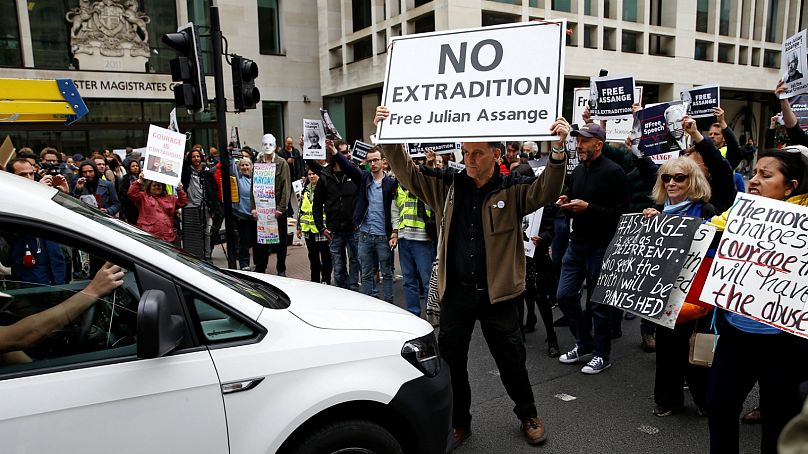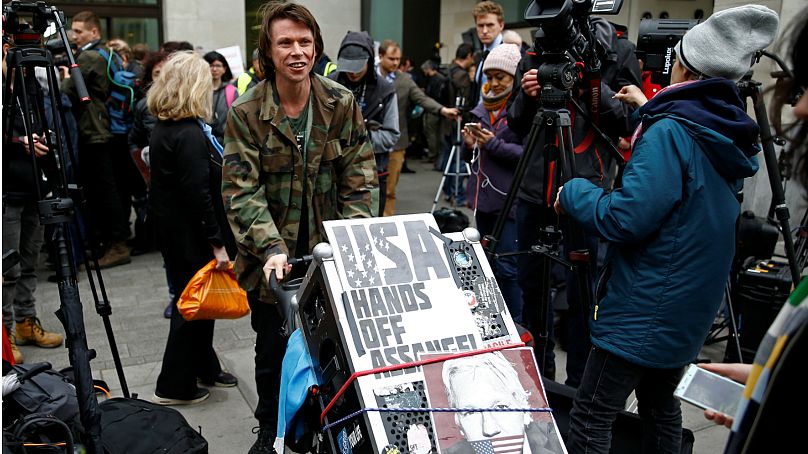The extradition hearing comes a day after the WikiLeaks co-founder was sentenced to 50 weeks in jail for breaching bail conditions in the UK.
WikiLeaks co-founder Julian Assange has faced his first hearing in a US case seeking to extradite him from the UK.
 ADVERTISEMENT
ADVERTISEMENT
 ADVERTISEMENT
ADVERTISEMENT
Appearing via video link from London's Belmarsh Prison on Thursday, Assange said he did not want to surrender to extradition.
The brief hearing was then adjourned until later this month.
The 47-year-old is wanted in the US on a charge relating to conspiring to hack government computers with whistleblower Chelsea Manning.
Manning, who served seven years in prison in the US for leaking classified information to WikiLeaks, was sent back to prison earlier this year for refusing to testify against the organisation.
- READ MORE: Julian Assange: WikiLeaks co-founder's 50-week jail term for bail breach ‘an outrage’
- READ MORE: WikiLeaks co-founder Julian Assange arrested and dragged out of embassy after US extradition request
- READ MORE: How could seven years in the Ecuadorian embassy have affected Assange's health?
The start to the hearing on Thursday was overshadowed in part by the case being assigned to a particularly small room at the court in central London, meaning few journalists and no members of the public were able to be in attendance.
According to journalists outside the court, protesters were chanting about the "disgrace" of not being allowed to enter, before threatening to rush the entrance door.
Lauri Love, a friend of Assange and a British activist who is accused of hacking data from several agencies in the US such as the Federal Reserve, NASA and the US army in 2012 and 2013, also took part in the protest outside the court.
The 34-year-old was subject to his own US extradition case in 2013, but it was later blocked by the UK High Court, which feared the effect a possible extradition would have on Love's mental health.
"We accept that the evidence shows that the fact of extradition would bring on severe depression, and that Mr Love would probably be determined to commit suicide, here or in America," judges Ian Burnett and Duncan Ouseley said.
Love has Aspergers syndrome and is known to suffer with depression.
Assange's extradition hearing on Thursday came less than 24 hours after he was sentenced to 50 weeks in prison for breaching bail conditions in the UK.
He was arrested last month at the Ecuadorian embassy in London, where he has resided for the last seven years, after the South American nation revoked his asylum for "discourteous and aggressive" behaviour.
Assange had sought asylum with Ecuador in 2012 to avoid facing extradition to Sweden on charges of rape and sexual assault.
He was welcomed by Ecuador's then president Rafael Correa, resulting in Assange taking up residence inside the embassy in the UK capital.
WikiLeaks' editor-in-chief Kristinn Hrafnsson said on Wednesday that Assange's bail sentence was an "outrage", but that the extradition hearing on Thursday would be the beginning of the "big and most important fight".
He added: "It could be a question of life or death for Mr Assange. It is also a question of life or death for a major journalistic principle."












